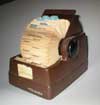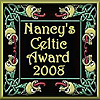| |

Traditions, folklore, history and more. If it's Irish, it's here. Or will be!
"People will not look forward to posterity who never look backward to their ancestors."
-Edmund Burke




Quotes
Library: Books, Movies, Music
Prints & Photos
Poetry
Jokes


Shops Ireland
Bunús na Gaeilge
(Basic Irish)
Circle of Prayer
Blessings
Did You Know?
Himself/Herself
Write to Us
Readers Write..
Links/Link to Us
Advertise with us
Awards & Testimonials
Submissions Guide


|
|
|
New Year's Day to Epiphany
by Bridget Haggerty
 In this last week of the season, even as a child I could feel the mixed emotions of leaving behind an old year and welcoming the new. In Ireland long ago, on New Year's night they'd remember those in the family who'd passed on the year before by setting a place at the table and leaving the door unlatched. In our house, from morning to evening, we welcomed all who came through our door - and, thanks be to God, the only spirits among them were the ones that came in a bottle! In this last week of the season, even as a child I could feel the mixed emotions of leaving behind an old year and welcoming the new. In Ireland long ago, on New Year's night they'd remember those in the family who'd passed on the year before by setting a place at the table and leaving the door unlatched. In our house, from morning to evening, we welcomed all who came through our door - and, thanks be to God, the only spirits among them were the ones that came in a bottle!
As opposed to the day before, when it was considered unlucky for anyone to take food from the house, on New Year's Day my mother sent friends and neighbors on their way with little packages of whatever could be spared. In turn, we received from them the leftover bounty of their tables - dainty cakes, scones, some slices of boiled ham or spiced beef, little triangles of foil-wrapped Danish cheeses, even pickled herring, which was particularly prized by my father. And all day long, the kettle was on the boil for copious pots of tea - for the talkin'.
Well into the evening, there'd always be a small group gathered around the fireplace, laughing and joking. Sooner or later, the conversation would turn to reminiscing about Ireland. The old ones, well on their way with a few glasses of the hard stuff, would get all misty-eyed as they reminded each other that today was the official start of the salmon fishing season; there'd be heated debates as to where the best catch was to be had and then they'd begin telling stories. They were the same stories every year. In the light of just the fire and the candles burning on the windowsills, we heard once again about young girls who put mistletoe under their pillows on New Year's Eve, in hopes of dreaming about their future husband; about beggars who wouldn't ask for food, and about a specially baked bread called a Christmas loaf which would be pounded against the bolted door in the name of the Trinity. At the same time, the head of the house said a prayer that starvation would be banished from Ireland and go to the King of the Turks. Much to my regret, I never asked, and have not found out why that poor king should be so cursed. Perhaps, as I continue my research into Irish history and folklore, I'll uncover the reason. Kevin Danaher, in his book The Year In Ireland doesn't elaborate. But he does mention an old custom that I didn't know about until recently...
Handsel Monday was celebrated on the first Monday of the New Year and it was a day on which children would visit neighbors, friends and relatives to ask for a 'handsel' - a small gift of money. It was considered to be very unlucky to refuse a child this gift and thought by many to be even more fortunate if one were to give the gift before being asked for it. In some parts of Ireland, children were given cakes instead of coins and the day itself was often observed on New Year's Day instead of the Monday after. Whether or not this custom still exists, I do not know - but it's not something that I remember from the stories I was told as a child. More than likely, this tradition, as with so many others, had already died out. Not so with the customs of Epiphany.
In my mother's house, the Feast of the Three Kings was called Little Christmas. When she was a girl, it was also known as Nollaig na mBan or Women's Christmas. This was a very special occasion when the women would gather for what we'd call a high tea - with wine! There are some who say that water turns into wine on this day in honor of the Magi, others who maintain the miracle occurs because it's the Anniversary of the Wedding Feast at Cana. To whomever or whatever you attribute the miracle, it's thought to be very unlucky to try and watch it take place.
So here it was, the 12th day of Christmas. My mother, true to her roots prepared a very special tea and our dad did his best to be home for it. We lit the third candle and my dad told us about a special cake his mother used to make. To this day, it still scares me to death. A candle would be placed in the cake to represent each member of the family. In the evening, the candles would be lit and then watched. As each candle went out, either extinguished by a stray draft or burnt itself down, that would be the order of death. My mother always tried to stop him, but he'd get this mad twinkle in his eye as if he was all the ghosts of a Charles Dicken's Christmas drawn into one. And who can stop that.
After tea, there'd be a recap. All the people we'd seen; a last look at the cards; the great times we'd had - and, oh, the marvelous food. Always the food. And then, since this was the last day of Christmas, we were allowed to stay up until midnight so that we could watch our mother put out the candles. The next day, the decorations came down and the holly, now withered, was carefully burned in the fireplace since it was thought to be unlucky to just throw it in the trash. Not so with the tree. Perhaps that was because it hardly looked like a tree anymore, what with most of its needles gone.
Today, I try to maintain many of the 12th night traditions I remember as a child - but, when our kids were grown up, we made a major change in the gift-giving ritual. Epiphany is now when we open our presents. The rationale is that if it was good enough for the baby Jesus to get His gifts on this night, then it should certainly be good enough for us. The biggest benefit is that we enjoy a very relaxed Christmas Day and then, in the week or so that follows, we can shop for bargains! I've told a lot of people about this idea and many of them like it so much, they've adopted it too; I have to wonder how long it will be before the retailers catch on!
Right before the presents are opened, the Three Kings are placed in the Nativity set and the scene is complete. After the gift exchange, we enjoy a late supper and a few hours of conversation until midnight. Then, as in the Christmas seasons of my childhood, every candle in the house is snuffed out.
God bless the corners of your house and all the lintels blessed.
And bless the hearth and bless the board and bless each place of rest,
And bless each door that opens wide to strangers as to kin,
And bless each crystal window pane that lets the starlight in,
And bless the rooftop overhead and every sturdy wall.
The peace of man. The peace of God. With peace and love for all.
Irish Christmas Blessing.
Image: Star in the East from Bare Walls photos and Prints.
For more of our Holiday Stories click on the following links.
Advent/Christmas Holidays
Time at this Point in the Year
An Advent Memory
Yes, Kelsey and Maddie, there is a Santa Claus
Waiting for St. Nicholas
Christmas - Ireland's Most Wanted Gifts, 2002
Christmas - Preparing the Puddings
Christmas - Food for the Feast
An Irish Christmas - Then & Now
An Irish Christmas - The Day Before
Memories of Christmas Eve Past
An Irish Christmas - Ding Dong Merrily On High
Seasons Greetings in Irish
St. Stephen's Day to New Year's Eve
New Year's Day to Epiphany
Many Years Ago by John B. Keane
|
|
Fri, Sep 27, 2024
 The Galway Hooker The Galway Hooker
This unique vessel, with its distinctive curved lines and bright red sails, originated in the village of Claddagh. During the 19th century, hookers supported a significant fishing industry and also carried goods, livestock and fuel. Seán Rainey is remembered for building the last of the original boats, the Truelight, for Martin Oliver who was to become the last king of the Claddagh; as king, he was entitled to white sails on his boat. Since the mid seventies, many of the old sailing craft which were on the verge of extinction have been lovingly restored and new ones have been built. During the summer months they can be seen at festivals such a Cruinniú na mBád - the Gathering of the Boats - in Kinvara.
Click for More Culture Corner.
A magnificent pictorial tribute to the splendor of Irish gardens, featuring more than 200 color images.
Eclare ushers readers into spectacular Irish garden settings...
Equally captivating are the book's gorgeous photographs of plants, beautiful stonework, outstanding statuary, and the voluptuous floral compositions that adorn Ireland's great castle estates, rural herb growers, country guest houses, and quaint cottages.
Alice Joyce
Click for Glorious Gardens.
|
|
|
|
|




 The Galway Hooker
The Galway Hooker